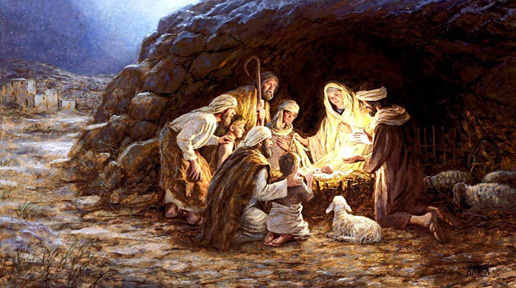Jesus, the Prince of Peace
Rev. Fr. Don Anton Saman Hettiarachchi
"... and on earth peace to those on whom his favour rests"
(Luke 2,1-20)
The birth story of Jesus in Luke 2,1-20 (the Reading of the Christmas
Liturgy at midnight and dawn) narrates that "the whole world" - the
whole Roman world: Rome, Italy and the Roman provinces - is engaged in a
census. In the midst of this census, Jesus is born.
Luke the Evangelist combines Jesus' birth in Bethlehem with this
census or secular history.
He wishes to underline the significance of Jesus' birth (that occurs
in one of the Roman provinces) for the whole Roman world. What is the
cosmic significance of Jesus' birth? The world, now busy with census,
needs badly true peace and salvation.
|

The birth of Jesus is the dawn of a new age |
It is through this Child born in Bethlehem that peace and salvation
will come to the whole Roman Empire; it is this Babe born at Bethlehem,
the House of Bread, who will be the Bread of salvation and peace to the
world history.
Who decrees the census? It is "Caesar Augustus." The Roman Empire
regarded Augustus as 'saviour' and 'god.' It credited him with
establishing a time of peace, the Pax Augusta, during his long reign
from 27 BC to 14 AD since he could end almost a century old civil war
that had ravaged the Roman realms and close at last the doors of the
shrine of Janus in the Roman Forum, thrown open in times of war. Here,
some historical evidence:
i. The Ara Pacis Augustae (a great altar) was erected in 13-9 BC to
the peace brought about by Augustus.
ii. The Greek cities of Asia Minor adopted September 23, the birthday
of Augustus, as the first day of the New Year.
iii. At Halicarnassus, Augustus was hailed as the saviour of the
whole world.
iv. The Priene inscription grandiosely proclaimed Augustus as god:
"The birthday of the god marked the beginning of the good news for the
world."
Contradicting this imperial propaganda, Luke the Evangelist intends
to underline:
i. that the edict of Augustus provides a solemn setting for the birth
of Jesus and so, the great emperor is simply God's agent, like the
Persian king Cyrus (559-529 BC) in Isa 44,28 - 45,1, who provided the
occasion for God's purposes to be accomplished - as he conquered Babylon
(538 BC), liberated the Jews from their captivity, permitted them to
return to Israel and patronised the rebuilding of Jerusalem and the
Temple.
ii. that Jesus is the true peace-bearer. People built an altar to the
Pax Augustae, but a heavenly chorus proclaims the pax Christi: "... and
on earth peace to those on whom his favour rests" (2,14).
iii. that the birth of Jesus is the dawn of a new age. People marked
the birthday of Augustus as the beginning of the good news for the
world. However, the birthday that marked the true beginning of a new
time took place not in Rome but in Bethlehem. The angel of the Lord
heralds, "Do not be afraid; for behold, I proclaim to you good news of
great joy that will be for all the people. (2,10).
iv. that Jesus is the real Saviour, Lord and Messiah. People honoured
Augustus as their savior and deified him as their god. But the heavens
proclaim Jesus as Saviour, Lord and Messiah: "For today in the city of
David a saviour has been born for you who is Messiah and Lord" (2,11).
The multitude of the heavenly host with the angel sings, "... and on
earth peace to those on whom his favour rests." The Christ event brings
peace. This peace is for those whom God has favoured with His grace.
This peace is more than the absence of war of the Pax Augusta. It also
includes the prosperity, security, integrity and well-being
characteristic of peace (shalom) in the Old Testament. Today the world
thirsts for peace. The post-war Sri Lanka too cries for peace still.
This peace which the whole of humanity pants for can be drawn only from
one fountain, Jesus who is the Saviour, Messiah, Lord and Peace-bearer.
The present day Caesars - political powers and world organisations -
cannot usher in true peace to our lives.
Jesus, the Prince of Peace, has commissioned us, His disciples, to be
ambassadors of peace till His second coming into our human history.
"Into whatever house you enter, first say, 'Peace to this household.' If
a peaceful person lives there, your peace will rest on him; but if not,
it will return to you" (10,5-6). Here the greeting of peace is not
merely a Jewish salutation but an effective word. If it finds no worthy
recipient, it will return to the speaker. During this Christmas, we will
bear this peace of Christ, a messianic blessing, to all the people of
goodwill with whom we co-exist in this tiny land of ours.
Courtesy: The Messenger
The writer is Dean of the Faculty of Theology, Aquinas University
College, Colombo 8 |

